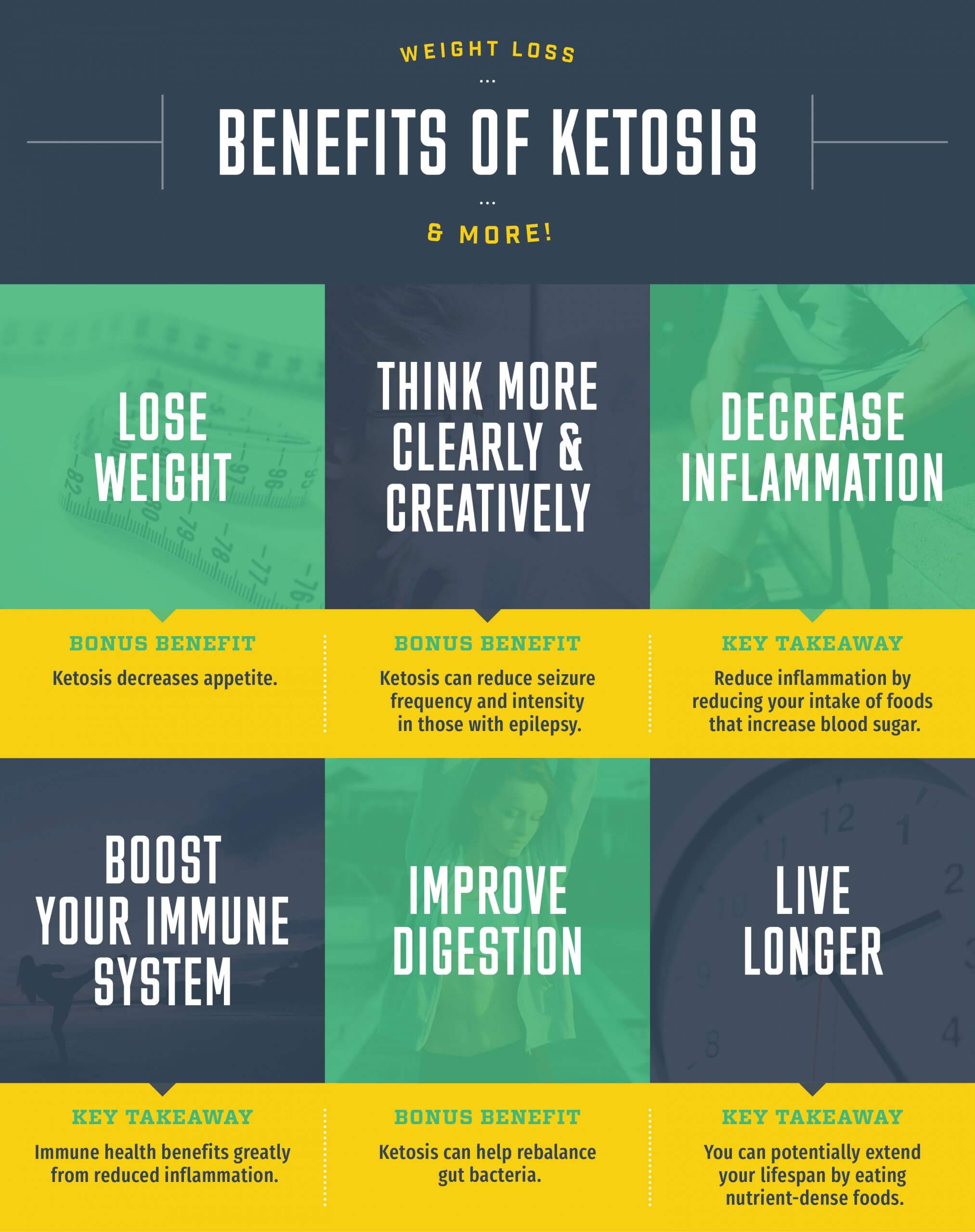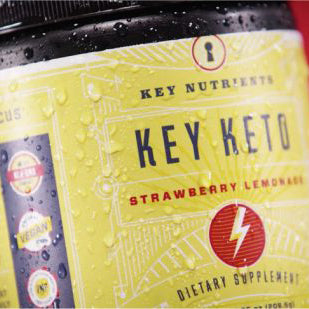Medically Reviewed by Dr. Bryan Seigel D.C., P.L.C.
Keto is a great tool to use for healthy and sustainable weight loss. But, while that might be the highlight for a lot of people, it’s far from the only thing keto is great for. Weight loss is just the beginning! We’re going to talk about brain health, inflammation, immune function, gut health, and longevity. It’s also a great way to power up your workouts. The metabolic state of ketosis can provide a lot of other health benefits in addition to supporting a healthy body weight.
Let’s review the core of the ketogenic diet.
In each of the stages of ketosis, you virtually eliminate carbs from your diet and use fats for fuel. These fats come from both foods and from stores already on your body. Your liver converts these fats to ketones, which then power the vast majority of your tissues. Besides healthy fats like butter, coconut oil, MCT oil, olive oil, avocados, and a small amount of nuts if you tolerate them, your diet will focus on whole food sources of protein like chicken, fish, and beef. It’s all rounded out by low-carb vegetables like leafy greens and broccoli. Nuts aren’t required on keto and many people don’t digest them well; they contain anti-nutrients and potentially rancid oils, so if you choose to have nuts it should only be a small amount. For someone new to the ketogenic diet, taking about four weeks to gradually reduce carbs will make the transition easy and painless, while true fat adaptation can take a few more weeks after that. We’ve got a great guide on starting the ketogenic diet. Pro tip! Don’t forget to add electrolytes, as this is the biggest reason people experience the dreaded keto flu and quit keto before they start seeing any of the benefits.
What about the weight loss?
Before we dive deep into all the other benefits of keto, let’s talk about why the ketogenic diet tends to work so well for so many people who are trying to lose weight. There is a perpetuated myth that if you eat fat, you’ll get fat, and this couldn’t be farther from the truth. Eating fat “trains” your body in how to burn fat for fuel more efficiently. The catch is, we humans are only good at burning one type of fuel at a time. So, if we want to be good at burning fat, we need to stay away from the sugars, and that includes the starches.
While you move through the stages of ketosis, you’ll notice your appetite naturally decreases. Because meals on keto are so nutrient and energy dense, you feel satisfied on less food, and it takes longer for your hunger hormones to kick back in. There’s something unique about using ketones for fuel in that they decrease appetite so you don’t have to struggle with hunger or constant cravings. This makes keto more sustainable and easier to see weight loss success with. Imagine eating until you’re satisfied and still being able to lose weight!
What else can keto do?
Keto is great for your brain!
Fun fact! A clinical ketogenic diet is often prescribed for those with epilepsy, especially children, because of how dramatically it can reduce seizure frequency and intensity. You’re probably not epileptic, but you can enjoy some of the same brain supporting effects by adopting a ketogenic diet. Ketosis has been proven to improve memory and cognition, even in older adults who have experienced cognition challenges. These studies showed that the higher the ketone levels, the better the cognitive improvements. Part of this might be due to those magical miniature power plants in your cells: the mitochondria. Ketosis triggers the growth of more of these little organelles so you literally have more energy available for your neurons to use.
Inflammation is soothed by sticking to keto!
Inflammation is sometimes a good thing, like when you get a papercut or a broken bone. Inflammation is caused by factors that stimulate healing of injuries. Sometimes though inflammation persists too long, and in our modern world that can be because of stress, lack of sleep, high blood sugar, and lots of other reasons. Keto does two things to decrease this systemic inflammation that can cause pain, stiffness, and eventual damage to joints and organs. First, simply by reducing the intake of foods that increase blood sugar, inflammation begins to decrease. Second, the ketone body beta-hydroxybutyrate (BHB) which is produced in the liver as fuel, has anti-inflammatory properties. So, if you want to cool the inflammation in your whole body and support optimal function, keto is the way to go.
How about the immune system?
Immune health is a big deal right now and everyone is paying closer attention to the things that keep them healthy and the things that put them more at risk. The first way keto helps to support immune health is by the above mechanic, by reducing inflammation. If the immune system is busy inflaming your tissues, it’s not going to do a great job with other pathogens. So simply by reducing inflammation you have more resources available to tackle any infections you might come across.
There is evidence to show that a ketogenic diet can directly support immune function not counting the boost from decreased inflammation. This study is in mice, but it has crossover in how human immune systems work. Scientists took two groups of mice, one fed on a high carb diet and one fed a keto diet, and infected them with the H1N1 flu. Four days later, all of the mice on a high carb diet were dead, while only half of the keto mice suffered the same fate. A certain kind of immune T-cell was upregulated in the keto mice which trapped more of the virus particles in mucous and limited how much of it could spread.
Notice your stomach feels better?
A lot of people report having better digestion and fewer stomach complains when they transition to a ketogenic diet. It turns out that keto stimulates stem cells in the intestines which support healing of damage and inflammation from previous, possibly unhealthy ways of eating. There are lots of ways our diet can cause intestinal damage, from low level allergens to additives in processed foods. Keto often removes a lot of these additives and allergens from the diet since you’ll be focused on whole foods. In addition, ketones seem uniquely well suited to attracting stem cells to the intestines to heal previous damage, which reduces pain and improves nutrient absorption.
Bonus, keto helps rebalance gut bacteria. All those little microbes that live in your gut also need fuel. The ones that feed on sugar can easily overwhelm a lot of the other species that do more important things for your health. Taking away that fuel source means the healthier gut bacteria can thrive.
What if keto makes you live longer?
Since we now know that dietary cholesterol and saturated fat aren’t the life-shortening health risks they made us believe in the ‘80’s, what if this way of eating confers a life extending benefit? Well, it turns out it can! There is a lot of promising ongoing research about nutrient cycling, autophagy, and specific metabolic pathways that unlock greater longevity in humans. A ketogenic diet mimics fasting because of the lack of refined carbohydrates, and due to the reduced appetite that is common on keto, calorie intake is spontaneously reduced. The research sounds complicated, and really, it is, because there are a lot of pieces to the longevity puzzle. But, a well-formulated ketogenic diet full of nutrient dense foods is shaping up to have a key role in extending healthy human lifespan.
What have we learned about the benefits of Ketosis?
You might have come to the ketogenic diet to lose weight, but you’re going to get more than you bargained for, and that’s a good thing! The benefits of ketosis are many, and not limited to burning body fat. You can think more clearly and creatively. You can decrease painful inflammation in your whole body. You can boost your immune system. You can improve digestion. You might even be able to live longer! Whether you’re new to keto or have been in ketosis for years, it’s a good idea to periodically check your ketone levels to ensure you’re in the optimal range to take advantage of all these benefits of ketosis. We’re with you every step of the way!
References:
Cheng, C.-W., Biton, M., Haber, A. L., Gunduz, N., Eng, G., Gaynor, L. T., Tripathi, S., Calibasi-Kocal, G., Rickelt, S., Butty, V. L., Moreno-Serrano, M., Iqbal, A. M., Bauer-Rowe, K. E., Imada, S., Ulutas, M. S., Mylonas, C., Whary, M. T., Levine, S. S., Basbinar, Y., … Yilmaz, Ö. H. (2019). Ketone body signaling mediates intestinal stem cell homeostasis and adaptation to diet. Cell, 178(5), 1115-1131.e15. https://doi.org/10.1016/j.cell.2019.07.048
Goldberg, E. L., Molony, R., Sidorov, S., Kudo, E., Dixit, V. D., & Iwasaki, A. (2019). Ketogenic diet activates protective γδ T cell responses against influenza virus infection. The Journal of Immunology, 202(1 Supplement), 62.7-62.7.
Krikorian, R., Shidler, M. D., Dangelo, K., Couch, S. C., Benoit, S. C., & Clegg, D. J. (2012). Dietary ketosis enhances memory in mild cognitive impairment. Neurobiology of Aging, 33(2), 425.e19-27. https://doi.org/10.1016/j.neurobiolaging.2010.10.006
Roberts, M. N., Wallace, M. A., Tomilov, A. A., Zhou, Z., Marcotte, G. R., Tran, D., Perez, G., Gutierrez-Casado, E., Koike, S., Knotts, T. A., Imai, D. M., Griffey, S. M., Kim, K., Hagopian, K., Haj, F. G., Baar, K., Cortopassi, G. A., Ramsey, J. J., & Lopez-Dominguez, J. A. (2017). A ketogenic diet extends longevity and healthspan in adult mice. Cell Metabolism, 26(3), 539-546.e5. https://doi.org/10.1016/j.cmet.2017.08.005







